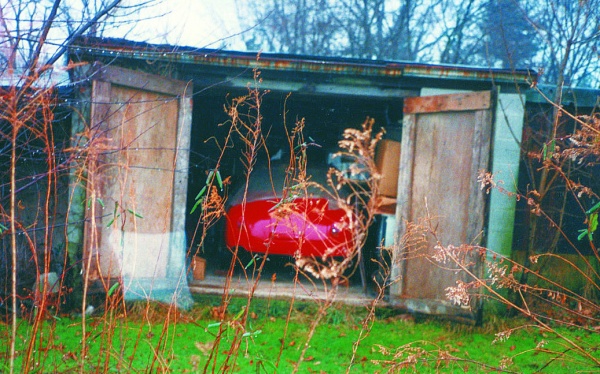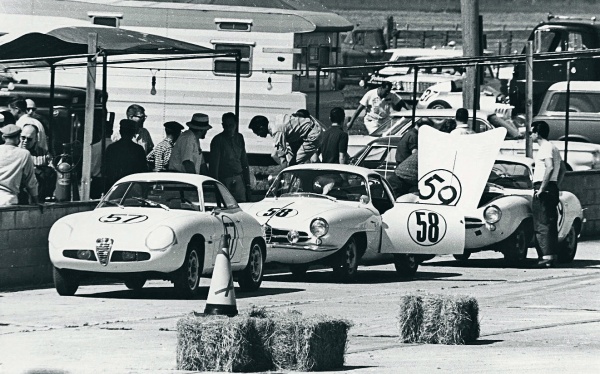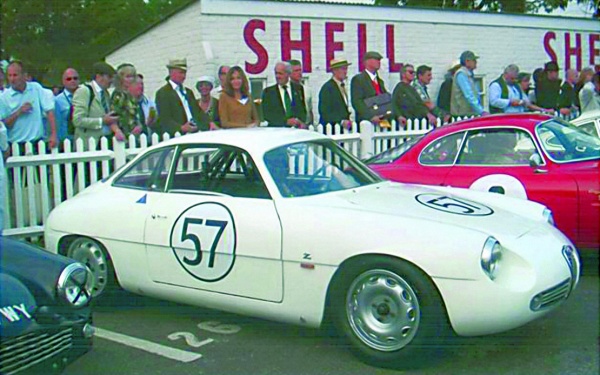
This Sunday’s In the Barn story is about the acquisition of an Alfa Romeo race car. Everyone knew about it, but it wasn’t easy to convince the owner to let it go. Enjoy the tale and be sure to subscribe to our mailing list for a chance to win a free copy of The Corvette in the Barn, the source of this story.
Not all barn finds are secret. Several years ago my friend Jim Maxwell and I purchased a 32,000-mile 1967 Shelby GT500 that many enthusiasts knew about. “Oh, you’re wasting your time, Bob will never sell,” they said. Yet today Jim and I own one of the most original big-block Shelbys on the planet. It called for relationship building, not a “Here’s my best offer; take it or leave it” mentality.
Jim McNeil of Bayport, New York, had a similar experience after hearing about a rare Alfa Romeo SZ that had been sitting in a chicken coop outside of Baltimore. “It was a known car,” said McNeil, who along with his wife, Sandra, own and race a number of desirable historic sports car. “But it was one of those stories of the owner who always said he was going to restore it. But he never did.”
Lots of enthusiasts knew about the little Alfa coupe, probably for as long as 35 years. When new it was sent by the factory to a Northport, New York–based team run by Lou Comito, otherwise known as Mr. Alfa. Actually, the factory sent three Alfas to be campaigned at the 1961 Sebring 12-Hour race by Mr. Alfa’s team.
“He juiced up the motors with hotter camshafts,” said McNeil. “They really produced some decent horsepower. If you wanted to race an Alfa, you couldn’t leave the 1290cc engine alone if you wanted to go fast.”
And go fast they did. Driver of a sister Alfa SZ in the 1961 Sebring race was Tommy O’Brien. He told McNeil more recently that “It was the fastest car at Sebring.” Actually, it wasn’t the fastest car, but with drivers Harry Theodoracopulos and Comito, the No. 57 Alfa finished 39th out of a 64-car field that included more powerful cars like Ferraris, Corvettes, and Porsches.

After Sebring, the car was sold to Lazy Vizelli, who continued to race it for five or six more years. In the early 1970s, the Alfa was sold to Ray Cuomo of Long Island before being sold to Ed Williamson of Brooklyn.
“Williamson knew it had a trick motor in it, so he bought it and pulled the motor out to put in his Veloce Spider race car, which he ran in the early VSCCA races for a number of years,” said McNeil.
After changing hands a few more times—to owners in Tennessee, Massachusetts, and back to New York—the rare little coupe was purchased by Frank Salemi of Connecticut. Salemi was a member of the Alfa Romeo Owners Club, and he intended to restore the car. But it sat. Eventually, McNeil began thinking about buying an SZ coupe after another Alfa was involved in an on-track altercation.
“I’ve always wanted a Z,” he said. “We were racing an Alfa Sprint coupe at the time, and we got into a fender bender. So that’s when I decided to look for an SZ.”
Through his crew chief at KTR Racing in Massachusetts, Andy Funk, McNeil heard about an SZ that was somewhere in Connecticut. He started a search for Sameli, who by then had moved to the Baltimore area, which complicated the search.
McNeil put the word out among his Alfa buddies that he was looking for an SZ that had vanished, when one day he got a phone call from an enthusiast from Baltimore. “He told me he knew of a coupe that was sitting in a chicken coop,” said McNeil. “But he also said it wasn’t for sale, that the owner was going to restore it.
“Well it was the same car I had been trying to find in Connecticut, but the leads had all dried up. It was obvious, though, that after owning the car from 1973 until 2000, if he didn’t restore the car in that time, he wasn’t going to restore it.”
He called Salemi and told him he was a serious buyer. “I had to convince Salemi that we were the right people to own and restore that car,” he said. He was successful and was offered the car.
“He sold it to us pretty inexpensively, but we had to invest a lot into it,” he said. “It wasn’t as nice as it had appeared. You could almost stand on the ground while inside the car; it was that bad.”
KTR Crew Chief and General Manager Funk agrees. “It was clear that the car had been wrapped around a tree at some point in its life,” he said. “It wasn’t straight at all. It was loaded with Bondo, probably from a quickie restoration done sometime in the 1960s. It had shiny paint, but once we stripped it off, there wasn’t much left.”
Funk and his crew took more than two years to restore the tired race car into the condition it was when it first entered Sebring 40 years earlier.

Since then, with Sandra McNeil driving, the car has competed in vintage races at Lime Rock, Connecticut, and at the 2009 Goodwood Revival in England. The McNeils are pleased with the newest addition to their race car collection. “They’re not furniture, we like to use our cars,” said McNeil.
Even Funk, who got many bloody knuckles while restoring the coupe, has warm feelings about the car. “It’s a neat little car now,” he said. “We brought it back from the dead.”






first, thanks for the free ” in the barn ” book contest. i have “the harley in the barn” in the mail to me right now and look forward to reading it. (i hope it is alright to post that). second , another great story. glad they found the car and love the fact that they are driving/racing it.
I’ve got and read all of Tom Cotters “Barn series” books. Lookout! its easy to daydream about these ‘finds’ for hours and not get the “honeydo” list done, and get into trouble with the bosslady at home. They even make good reading the second time!.
Thanks Tom, I to am waiting for my Cobra in a barn book. These SZ’s are amazing, beautiful cars & like all Alfa’s of the day rusted badly so no surprises there, always the question for me is how they find body parts for these, my guess is hand make them, I owned a Duetto for 26 years & couldn’t even buy a tail lamp lense so I could never park the car for fear of someone hitting it. Great story thanks.
These Zagato-bodied Giuliettas SZs are among the most sought-after 1960s Alfas. Many were made with aluminum bodies for competition, all hammered out by hand. Hammering body panels by hand and testing the fit on a wooden buck was the usual procedure in the small shops in italy back then.
I’m not sure the SZ did well at Sebring in ’61, though. The results list I found says that it was the #58 and #59 Giulietta Sprint Speciale models shown in the 1961 Sebring photo above that finished 27th and 33rd, and that the #57 SZ did 103 laps but was ‘not classified’.
The rounded back end design of these first-year cars didn’t last long, and was replaced by the Kamm tail version called the TZ, the ‘T’ being for Tronca (Italian for truncated, or cut off). This change increased top speed and made the cars more competitive. Better looking, too, altho that was probably secondary to speed and competitiveness. A results list I found for the Giulia TZ showed the benefit of the body change (and a larger 1600cc engine), with dozens of good placings in races during the 1960s.
Eehhh… An Alfa TZ is a Tubolare Zagato – not Tronca Zagato. There were SZ’s called Coda Tronca and they had Kamm tails.
Nice. Is there a pic of the finished car?